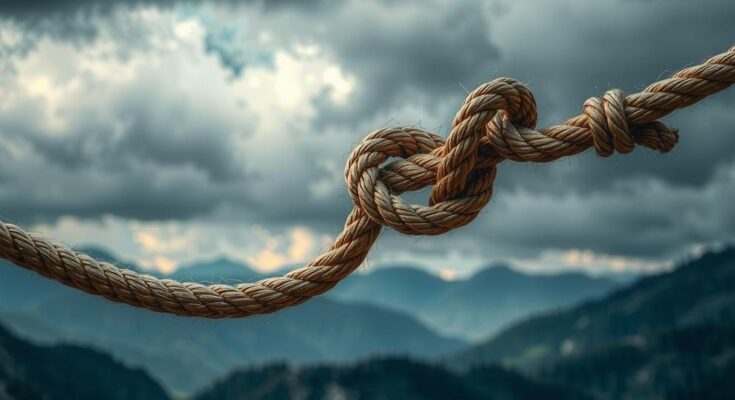The Democratic Republic of the Congo has cut diplomatic ties with Rwanda as fighting intensifies with the M23 rebel group near Goma. This escalation has resulted in civilian displacement and a rise in casualties among peacekeepers. Accusations of Rwandan support for the M23 complicate an already volatile situation in a region plagued by ongoing conflict and humanitarian crises.
The Democratic Republic of the Congo (DRC) has officially severed diplomatic relations with Rwanda as the M23 rebel group, which is suspected of receiving Rwandan support, advances towards the vital eastern city of Goma. The ongoing conflict has resulted in the deaths of at least 13 peacekeepers and foreign soldiers, while thousands of civilians have been displaced due to the fighting around Goma, home to approximately 2 million people.
Recent weeks have seen the M23 group gain substantial territory near the DRC-Rwanda border. The DRC government, along with the United States and United Nations experts, accuses Rwanda of providing support to the M23 rebels, primarily composed of ethnic Tutsis who defected from the Congolese army over a decade ago. The eastern DRC is home to roughly 100 armed groups competing for control in a region rich in natural resources, contributing to one of the world’s largest humanitarian crises.
While the Rwandan government denies claims of aiding the M23, it has admitted to deploying troops and missile systems in eastern Congo for security reasons, citing concerns over Congolese force buildups along the border. According to United Nations experts, an estimated 4,000 Rwandan forces are present in the DRC. In response to the escalating situation, the DRC’s Foreign Ministry announced the immediate withdrawal of all diplomatic personnel from Rwanda.
Heavy gunfire was reported around Goma, prompting an urgent meeting by the U.N. Security Council concerning the violence in eastern Congo, requested by the DRC government. Many displaced individuals fled from the Kanyaruchinya camp towards Goma, fearing for their safety. One resident, Safi Shangwe, commented, “We are fleeing because we saw soldiers on the border with Rwanda throwing bombs and shooting.”
Concerned for their safety, many people attempted to cross into Rwanda. Muahadi Amani expressed, “I am crossing to the other side to see if we will have a place of refuge because for the moment, security in the city is not guaranteed.” Meanwhile, the M23 has reportedly captured Sake, only 27 kilometers from Goma, increasing fears of Goma’s imminent fall.
DRC’s military claims to have repelled an M23 assault with support from allied forces, including U.N. peacekeepers and Southern African forces. Tragically, several peacekeepers have lost their lives amid the conflict, with fatalities reported among troops from South Africa, Uruguay, and Malawi. Since 2021, the DRC and its allies have been working to prevent M23 from advancing on Goma, which remains a crucial area in the region.
The Democratic Republic of the Congo is currently facing a significant humanitarian crisis fueled by ongoing civil conflicts involving various armed groups, including the M23 rebels. The M23 faction, rooted in complex ethnic dynamics and historical grievances, has sparked international concern, particularly regarding regional stability and potential cross-border conflicts involving Rwanda. The DRC’s rich mineral resources, amidst this turmoil, continue to attract various armed factions, deepening the humanitarian challenges for civilian populations in the area.
In conclusion, the escalating situation in the Democratic Republic of the Congo, marked by the M23 rebel group’s advances towards Goma and the severing of diplomatic ties with Rwanda, highlights the fragility of regional security. Displacement and violence present dire humanitarian issues, with international actors calling for immediate attention to restore peace and stability. The conflict underscores a longstanding history of ethnic tension, military involvement, and the profound impacts on civilian lives.
Original Source: www.france24.com




